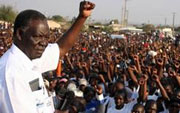 Zambia’s sixth multiparty election on September 20, 2011 saw the defeat of incumbent President Rupiah Banda, candidate from the Movement for Multiparty Democracy (MMD) that had ruled the southern African country since 1991. Michael Sata won by a margin of 43% to 36%, elected mostly by disgruntled poor and working-class Zambians who are yet to benefit from the economic growth caused by massive Chinese investment in recent years.
Zambia’s sixth multiparty election on September 20, 2011 saw the defeat of incumbent President Rupiah Banda, candidate from the Movement for Multiparty Democracy (MMD) that had ruled the southern African country since 1991. Michael Sata won by a margin of 43% to 36%, elected mostly by disgruntled poor and working-class Zambians who are yet to benefit from the economic growth caused by massive Chinese investment in recent years.
Chinese investments constituted the main issue of the 2011 presidential election, even though the Sino-Zambian relationship dates back to 1970, with the construction of the Tanzania-Zambia Railway, a $500 million project which was, at the time, the largest foreign aid project undertaken by China.
Key Conclusions
Several commentators described Zambia’s 2011 presidential election as a referendum on China, increasing the potential for violence, but the election remained generally peaceful and is an example of non-violent democratic transition in sub-Saharan Africa—an achievement that is no longer unique, but still too rare in this part of the world. (This map shows 2011-12 elections in Africa)
Beyond the lesson of democracy, President Sata’s victory also resonates as a wake-up call to those African leaders who ignore their citizens’ needs for more equitable and inclusive development.
At the same time, while President Sata’s anti-Chinese rhetoric was the main “refrain” during the campaign, it will be hard to sustain in the face of the needs of this impoverished country of 13 million people. President Sata has already toned down his words, knowing how much Zambians, as well as other Africans, need China’s investment. Ultimately, a better relationship will be mutually advantageous.
Analysis
In his inauguration speech on September 23rd, President Sata emphasized the importance of foreign investment to his country, “as it does not only create jobs but equally contributes to the economic empowerment of Zambians.” He pledged to continue working with the investors already in the country, and expressed his readiness to welcome new ones, as long as they adhere to national labor laws protecting Zambians from exploitation and discrimination. This warning was reiterated to Zhou Yuxiao, the Chinese ambassador to Lusaka, who was President Sata’s first official appointment after the inauguration.
However, the 2011 electoral campaign presented two opposing views of managing the growing economic relationship between China and Zambia.
On the one hand, Mr. Banda, elected in 2008 following the death of President Levi Mwanawasa, adopted a pragmatic approach, combining China’s thirst for mineral resources with Zambia’s position among the major copper and cobalt producers. Since 2007, China—the world’s second largest economy—has invested over $6 billion in Zambia. (Zambia’s GDP is only $16 billion.) In 2010, Sino-Zambian trade reached $2.5 billion, with officials from both countries claiming the creation of about 20,000 jobs, mostly in the mining industry.
Besides mining, the Chinese economic presence is also increasingly visible in the trade industry, from imported textiles and electronics to local poultry farming. There are now about 300 Chinese companies in Zambia, most of them privately owned. Zambia hosts two of China’s Special Economic Zones (SEZs) located in Africa, and the Lusaka’s Bank of China branch recently became the first to offer Chinese currency banking services on the continent. Such a “preferential” investment climate led to assertions that Banda’s party may have benefited from Chinese funds during the election campaign, allowing him to achieve extensive and unprecedented coverage throughout the country.
On the other hand, President Sata presented himself as a champion of the poor–he is known as “King Cobra,” due to his tough stand against deplorable labor conditions in Chinese-owned mining firms. In previous presidential campaigns (this was his fourth), President Sata strongly denounced the “slave wages” paid at foreign-owned copper mines and threatened to throw out Chinese investors, arguing they were “only out to exploit us.” Chinese companies are often faulted for importing their own workers while mistreating the few locals they employ. On two occasions in 2010, Chinese mine managers shot and injured close to twenty local workers during wage and labor protests (the charges brought against the mine managers were later dropped). These cases have strained the relationships between the Chinese and the locals.
During the electoral campaign that led to his victory, President Sata was said to have toned down his anti-Chinese rhetoric, explaining he would welcome Chinese investors if they respected the country’s labor laws. With an annual average economy growth of 6% over the past five years that may exceed 7% this year, his populist stands may well not survive his election. However, in a country where two-thirds of the thirteen million inhabitants still live on less than $2 a day, expectations are high on the newly-elected president to ensure that the Chinese-brought prosperity trickles down.
The voting out of former ruling MMD after twenty years in power, despite the economic growth facilitated by China’s investment, carries with it the demand of Zambians for more equitable growth, transparency, and accountability. And while the peaceful power alternation in Zambia offers a clear lesson of democracy to many of the continent’s leaders, it is also a vivid expression of the growing intolerance towards leaders who do not put the interests of their people first.
Photo caption: President Michael Sata in an undated photo.




